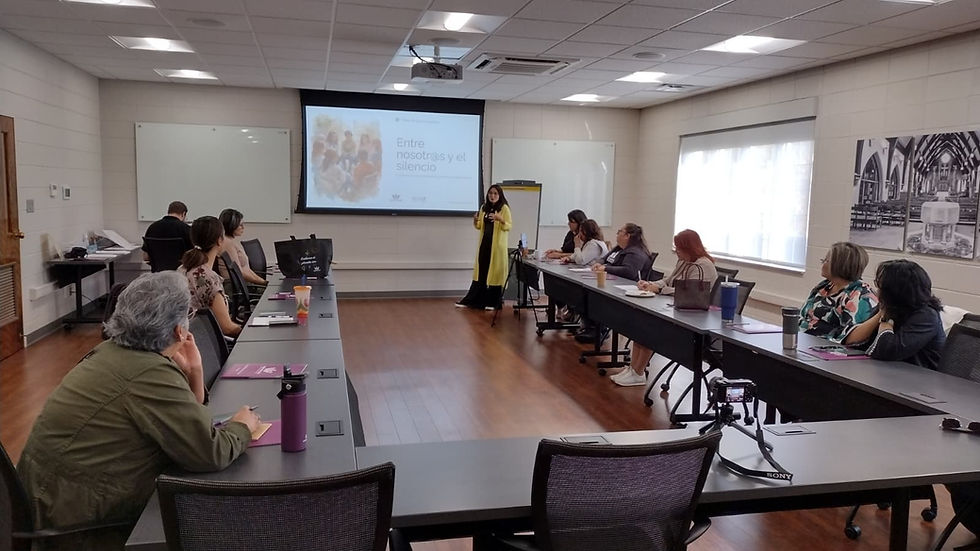EMPOWERMENT IS NOT A NUMBER, IT IS FELT IN DAILY LIFE
- Jaynne Rivas
- May 8
- 3 min read

In recent years, talking about female empowerment has become almost obligatory in social projects, institutional speeches, and public campaigns. However, behind this powerful concept lies a great deal of confusion. What does it really mean for a woman to be empowered? Who decides? And how do we know if we're making progress or just repeating pretty words?
Sometimes empowerment is presented as an individual goal, almost as a
medal that is won when a woman “achieves something.” Other times, it is measured as if it were a
Numbers: how many women have jobs, how many have finished school, how many participate in politics. But these indicators, although useful, fall short when it comes to capturing the most important thing: the internal, relational, and collective change that occurs when a woman begins to recognize herself as a subject of rights, with a voice, a history, and power.
Almost two decades ago, a group of women thought that another way of
address this issue. After two years of work, research, and dialogue, the Commission on Women and Development published a methodological guide in 2007 that remains relevant today for a very simple reason: they dared to define empowerment through the lens of women's everyday lives.
More than a recipe, this guide offers a complex, in-depth, and practical look at the process of empowerment. Not as a state to be achieved, but as a path to be taken. And not alone. The guide makes it clear that empowerment doesn't happen only in a woman's head or heart, but in her relationships, her environment, and the way she organizes with others. Because a woman may feel she makes decisions for herself (personal level), but if her word is not respected at home (relational level), or if her community doesn't listen to her (collective level), that
empowerment is incomplete, or may even be weakened.
This approach, which distinguishes between the personal, the relational and the collective, allows
understand why sometimes a woman feels strong and capable in one aspect of her life, but
Trapped in others. Therefore, a social intervention that only offers self-esteem workshops but doesn't change the conditions of the family or community environment may have little effect. The same is true in reverse: changing laws or creating services doesn't guarantee empowerment if women don't feel they deserve to use them or can't claim their place within them.
One of the most valuable contributions of this guide is its insistence on not separating the
empowerment of the contexts in which women live. There is no universal model. Each community, each group, and even each woman, needs to develop their own ways of assessing and advancing this process. Therefore, they propose working with living indicators, built from women's concrete experiences. It's not enough to know how many women are employed, but rather whether they feel respected in that work. It's not enough to count how many women participate in a meeting, but rather whether their opinions are heard and valued.
This requires time, dialogue, and sensitivity. And, above all, it requires letting go of the temptation to
Speak up for women. True empowerment begins when women can talk with other women about their lives, their fears, their limits, and their dreams. That conversation, which sometimes takes place in a kitchen, a community room, or a small workshop, is in itself an act of power. A power different from the one we're used to. It's not domination, nor control, nor competition. It's a power built on a network, that doesn't crush, but lifts.
The 2007 methodological guide is, in this sense, more than a technical tool. It's a reminder that empowerment isn't about intervening from outside, but about supporting processes already underway. It's about listening, opening up space, and trusting that women, when they organize, can transform not only their lives but also their communities.
[1] Charlier, S., & Caubergs, L. (2007). Methodological guide to the process of women's empowerment. Commission on Women and Development.
[2] Text prepared with the support of ChatGPT, OpenAI, 2025
[3] Diverse women engaging in household. Photo by M.studio. Generated with AI. Adobe Stock, image #1023064523.
Educational license acquired by Indiana University East. Accessed April 9, 2025.



Comments